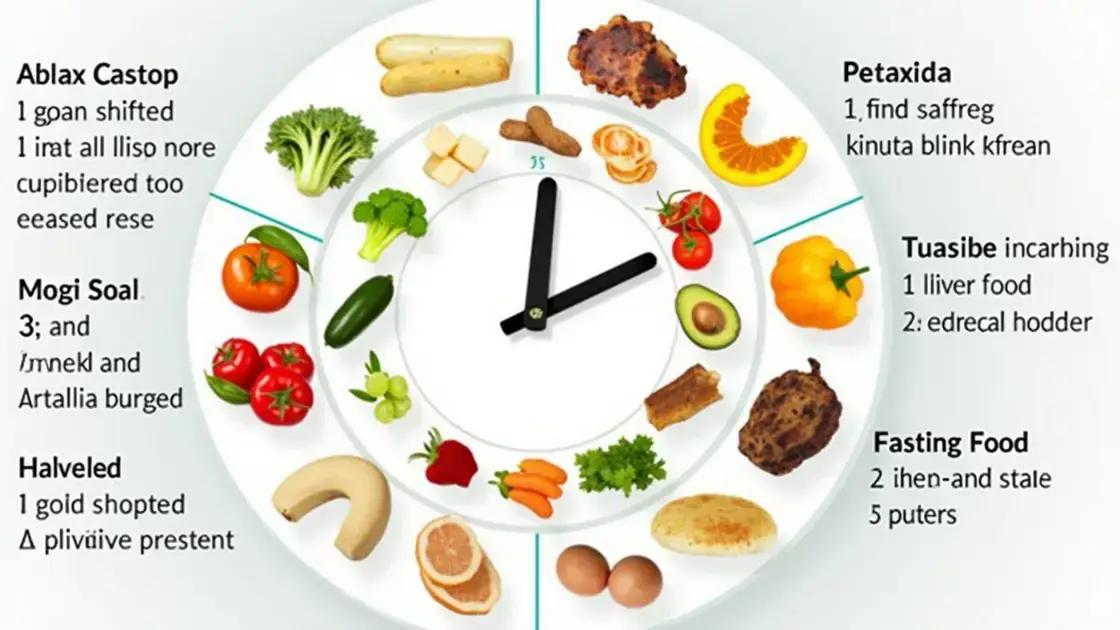Intermittent fasting is an effective weight management strategy that involves cycling between eating and fasting periods, promoting calorie reduction, improved metabolic health, and enhanced fat burning. By understanding the types of fasting, recognizing its benefits, employing strategies for success, and avoiding common mistakes, individuals can achieve their weight loss goals effectively.
Intermittent fasting is a powerful tool for weight management that can yield impressive results when done correctly. When using intermittent fasting, you cycle between periods of eating and fasting, allowing your body to burn fat more efficiently. In this article, we will explore the methods of intermittent fasting, their benefits for weight loss, effective strategies to adopt, and common pitfalls you should avoid.
Understanding Intermittent Fasting

Intermittent fasting (IF) is a popular dietary plan that involves alternating periods of eating and fasting. Many people find this method easier to stick to than traditional calorie-restricted diets. The core idea is to give your body a break from constant digestion, allowing it to focus on other processes such as repair and fat burning.
Types of Intermittent Fasting
There are several different methods of intermittent fasting. Some of the most common include:
- 16/8 Method: This approach involves fasting for 16 hours and eating during an 8-hour window. Most people follow this by skipping breakfast and only eating from noon to 8 PM.
- 5:2 Diet: With this method, you eat normally for five days of the week and restrict calorie intake to approximately 500-600 calories for the other two days.
- Eat-Stop-Eat: This technique involves a full 24-hour fast once or twice a week. For instance, if you finish dinner at 7 PM, you wouldn’t eat again until 7 PM the next day.
- Alternate-Day Fasting: This is a more intense approach where you alternate between days of normal eating and days of fasting.
How Intermittent Fasting Works
When you fast, several metabolic changes occur in your body. Insulin levels drop significantly, which makes it easier for the body to access stored fat. Additionally, growth hormone levels may increase, boosting fat loss and muscle gain. Fasting also triggers the repair processes in your cells, improving overall health.
Who Should Try Intermittent Fasting
Intermittent fasting can be effective for many people, especially those looking to manage their weight. However, it’s not suitable for everyone. Pregnant women, individuals with eating disorders, and those with certain health conditions should consult with a healthcare provider before starting any fasting regimen.
Understanding the principles and types of intermittent fasting is the first step toward effectively using it for weight management. It can offer flexibility and convenience while still helping you achieve your health goals.
Benefits of Intermittent Fasting for Weight Loss

Intermittent fasting (IF) can be an effective strategy for weight loss, helping you shed pounds while allowing flexibility in your eating habits. One of the most significant benefits is that it can help you simplify your meal planning and timing.
Weight Loss Through Calorie Reduction
By limiting your eating window with intermittent fasting, you are likely to consume fewer calories. When you have less time to eat, you may find it easier to cut back on unhealthy snacks and larger meals. This natural calorie reduction can lead to steady weight loss over time.
Improved Metabolic Health
Intermittent fasting can improve metabolic health by reducing insulin resistance. When insulin levels drop, fat storage decreases, allowing the body to burn fat more efficiently. This change can lead to significant fat loss, particularly in the abdominal area, which is linked to various health risks.
Enhanced Fat Burning
During fasting periods, the body enters a fat-burning state known as ketosis. When the body has no food energy to rely on, it starts to utilize stored fat for fuel. This process can significantly accelerate weight loss and improve overall body composition.
Hormonal Benefits
Intermittent fasting can positively affect hormone levels. In addition to decreasing insulin, fasting can also increase levels of growth hormone, which helps in fat loss and muscle preservation. These hormonal changes can enhance your body’s ability to lose weight while maintaining muscle mass.
In summary, intermittent fasting provides numerous benefits for weight loss, including calorie reduction, improved metabolic health, enhanced fat burning, and favorable hormonal changes. These elements come together to create an effective strategy for managing your weight with ease.
Effective Strategies for Success

Intermittent fasting can be effective, but having the right strategies in place is essential for success. Here are some effective methods to make your intermittent fasting journey easier and more successful.
Choose the Right Fasting Window
Select a fasting window that fits your daily routine. The most popular method is the 16/8 method, where you fast for 16 hours and eat for 8 hours. Choose eating times that are convenient for you, such as from noon to 8 PM or 10 AM to 6 PM.
Stay Hydrated
During fasting periods, drink plenty of water. Staying hydrated helps you feel full and can reduce cravings. You can also enjoy herbal teas or black coffee, which have little to no calories.
Plan Your Meals
Meal planning is important in intermittent fasting. Focus on nutrient-dense foods that will keep you satisfied during eating windows. Include lean proteins, healthy fats, fruits, and vegetables. Proper planning can prevent unhealthy snacking and overeating.
Listen to Your Body
Pay attention to how your body responds to fasting. If you feel dizzy or overly hungry, consider adjusting your fasting schedule. It’s essential to find balance and make fasting work for you, not against you.
To maximize success, try to combine intermittent fasting with regular physical activity. Exercise can increase the effectiveness of your fasting routine and help you achieve your weight management goals more quickly.
Common Mistakes to Avoid

While intermittent fasting can be an effective method for weight management, there are common mistakes that could hinder your progress. Avoiding these pitfalls can set you up for success.
Skipping Meals During Eating Windows
One mistake is purposely skipping meals during your eating window. This can lead to overeating later on or unhealthy food choices. Make a plan to eat balanced meals during your designated eating times.
Focusing Solely on Fasting
Many people think that simply fasting will lead to weight loss. While fasting is essential, it is equally important to eat nutrient-dense foods. Prioritize healthy options to fuel your body and support your weight loss goals.
Ignoring Food Quality
Imagine believing that any food is acceptable as long as it fits within your eating window. This can lead to choosing processed foods, high in sugars and unhealthy fats. Focus on whole foods like fruits, vegetables, lean proteins, and whole grains for the best results.
Not Staying Hydrated
Another common mistake is not drinking enough water during fasting periods. Staying hydrated is crucial as it can help curb hunger and maintain energy levels. Aim to drink plenty of water and consider herbal teas or black coffee to stay on track.
Lastly, avoid being too hard on yourself if you slip up or don’t see immediate results. Weight management is a journey, and understanding that it takes time can help you maintain a positive mindset.
Utilizing Intermittent Fasting for Weight Management
Intermittent fasting is a powerful and flexible approach to weight management that can fit into various lifestyles. By understanding the different methods, recognizing the benefits, and employing effective strategies, you can harness the full potential of this dietary practice.
However, staying mindful of common mistakes is essential for success. By planning your meals, staying hydrated, and focusing on food quality, you can optimize your weight loss journey.
Ultimately, intermittent fasting may not only assist you in achieving your weight goals but also improve your overall health. As you embark on this journey, remember to listen to your body and adjust your approach as needed.
FAQ – Frequently Asked Questions about Intermittent Fasting
What is intermittent fasting?
Intermittent fasting is a dietary approach that cycles between periods of eating and fasting, helping to manage weight and improve health.
How does intermittent fasting aid in weight loss?
Intermittent fasting can help reduce calorie intake, improve metabolic health, and enhance fat burning, leading to effective weight loss.
What are the most popular methods of intermittent fasting?
Popular methods include the 16/8 method, 5:2 diet, Eat-Stop-Eat, and alternate-day fasting.
Can I drink liquids while fasting?
Yes, you can drink water, herbal teas, and black coffee during fasting periods, as they contain minimal or no calories.
Is intermittent fasting suitable for everyone?
While many people can benefit from intermittent fasting, it is not suitable for everyone. Pregnant women and those with certain health conditions should consult a healthcare provider.
What mistakes should I avoid while intermittent fasting?
Common mistakes include skipping meals during your eating window, focusing solely on fasting without considering food quality, and not staying hydrated.













